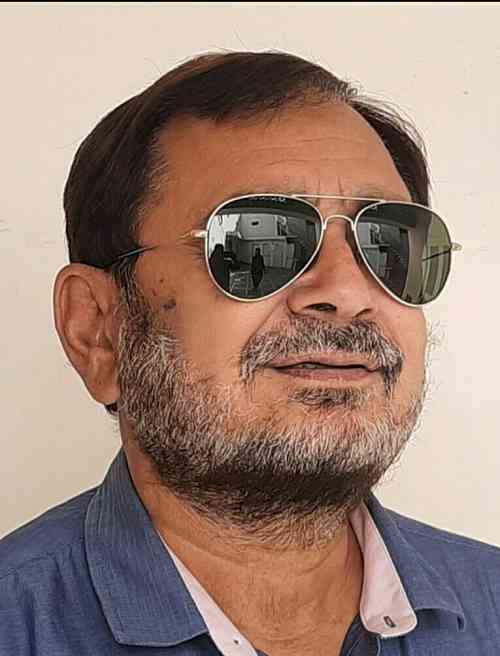2020 has been a tough year for the health care sector with many challenges and issues flared up with the pandemic
June 2020 onwards we saw a little light at the end of the tunnel with more and more patients being able to access corrective eye care and treatments

Authored by Dr.GSK Velu – Chairman, MaxiVision Group of Eye hospitals
2020 has been a tough year for the health care sector with many challenges and issues flared up with the pandemic. While hospital operations were hindered a lot by the COVID19 pandemic, and people fearing to venture out even for emergencies, maintaining the follow up of critical cases, was a choppy ride across the year.
In terms of the eye care sector, the most affected were old age patients who were already sick with a debilitating sickness. The pandemic made it very difficult for patients to access treatment and surgical procedures for non-emergencies. Ever since lockdown was announced and the country came to stand still, Maxivision as a responsible eye care provider, kept a few of our hospitals open with all safety protocols, for staff and patients, to service emergency eye care.
June 2020 onwards we saw a little light at the end of the tunnel with more and more patients being able to access corrective eye care and treatments. Every patient who walked in was treated with the utmost care and safety protocols.
We stopped all our outreach programs which are mass vision check camps, to avoid risks of infection. We stalled all our expansion plans which were conceived at the beginning of the year and rescheduled it to the year 2021.
Challenges of 2020
Due to movement restrictions for the elderly age group, which are most susceptible to many vision-threatening diseases, most patients were still reluctant to undergo treatment in a hospital or clinic due to fears of COVID-19. With issues like diabetic retinopathy and glaucoma which, if not treated on time they can cause much damage and can even cause irreparable damage or even permanent blindness in some cases, we unleashed a widespread digital communication campaign through social media, and our websites and also initiated online preventive eye care check-up. This was much helpful for people, who were confined to home, with the resounding and real fear of the pandemic. However, in the online check-up, we can only analyze partially the vision damages, and treatments of damaging diseases were not possible. Patients were more fearful to come to the hospital, as there were reports of hospitals not being diligent about hygiene practices and protocols resulting in cross-infections. This added to the distrust of people leaving them only with telemedicine as a possible channel of medical intervention.
However, in certain medical areas like eye care and treatment telemedicine was far from a solution as a physical examination of the eye and peripheral region is a necessity. In some faculties’ telemedicine can assist in treating the patient. With ophthalmology that’s really not a possibility. This made the journey even more challenging for eye care hospitals like MaxiVision in the treatment of existing cases of diabetic retinopathy and glaucoma and other emergency cases of eye care.
Still, we focused hard on reassuring our patients of our safety protocols and ensured that our patients, who walked in with a lot of fear, experienced the most hygienic treatment and care. Standardized high-class hygiene protocols were put in place to regain the confidence of the patient. Cross infections of COVID-19 was very high when the pandemic was at its rising peak. At MaxiVision Eye hospital we saw an estimated 50,000 visitors to 14 branch hospitals from 1st of June till 31st July out of which 20,000 are patients were with various eye problems. Not a single visitor got cross-infection of COVID-19.
We at MaxiVision included strict entry protocols with temperature check, giving patients masks, hand sterilizer, and also modifying our seating infrastructure, to compulsory ensure social distancing. We educated all our staff and doctors on these protocols and also regularly inspected the compliance. Essential to-dos in our hygiene checklist that encompassed maintaining and responsibility for hygiene by the patient himself, washing hands very often, to avoid face touching and if you wear contact lenses to avoid using them temporarily, as the chances of infection are higher if no proper hygiene is maintained. This helped us avoid cross-infections. Then slowly with time as work and life resumed doctors worked harder to fight time against all odds in treating the backlog of patients. And now is 2021 the positive is expected.
2021
Like every health care business community, we also are very optimistic that 2021 will be re-emerging of the regular practice of eye care. In 2021 we expect operations and workload to be back on track. In fact, it has pretty much resumed the old pace in the last quarter ending December 2020. At MaxiVision we were happy that none of our patients suffered from COVID-19 and we were available at their beck and call for the correct and timely redressal of their medical issues.
COVID pandemic has given our patient community learning of the importance of hygiene, the importance of vision, and also the value of our services and loyalty by standing by them during the peak of the crisis, braving all the risks. We still continue to maintain the strict safety protocols across our hospitals, and today it is a part of our operational routine. Our Inpatient and surgical processes have improved manifold, with airtight infection control processes, audits, and also an investment in more contactless technologies, like robotic cataract surgeries, bladeless surgeries, etc. All our hospitals are now sterilized on a routine basis, linens and other consumables are all one time used, and also the clinical rooms are fitted with air sterilizers and other air purifiers. Patients have to maintain social distancing in seating, waiting, and all other interactions with each other. Doctors wear disposable protective aprons, and all our close contact diagnostic equipment has a protective acrylic shield between the patient and the doctor. Any patients with the slightest symptoms of COVID are recommended to have tests done before they undergo any further treatment on the eye.
Vision is very important all time especially during crisis times. Vision health can be maintained only by preventive checks, and regular visits to the hospitals are very important especially for senior citizens. We still continue to do regular awareness campaigns to educate patients about the importance of vision care.



 cityairnews
cityairnews 









